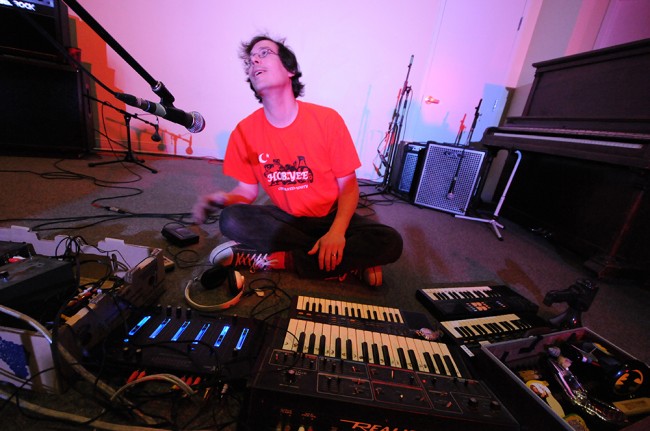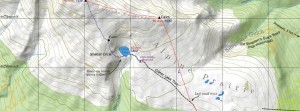
Photo Credit: Chris Wagner
Casse-Tête
Free improvisation with jazz roots. “New music” evolved from the classical tradition. Post-rock. Electronic noise. A performance piece woven from the sounds emitted by winter outerwear (think rolling zips, popping snaps and fat gloves clapping). Playing a heavily amplified electric guitar across the Fraser River to an audience standing on the opposite bank. Musicians releasing notes around the ruins of an old house while those gathered in the surrounding park are encouraged to hum the ones they catch. These are all experiences Jeremy Stewart might describe as “serious play,” and they have all found a home at Casse-Tête, an experimental music festival he delivers annually in Prince George.
“If it’s something you wouldn’t hear on the radio, it’s something you can hear at our festival,” Stewart says of the diverse programming. Since 2013, he has been attracting 50-60 artists to the city each year to participate in performances, panel discussions and workshops. Collaboration has been critical to the success of the festival, not only with community partners such as the City of Prince George, The Exploration Place and Theatre Northwest, but also between members of the Casse-Tête board and, of course, the artists themselves.
Coming from BC and beyond, about half of the artists in attendance any given year have performed at the festival before, allowing Stewart to build on existing relationships and reap the rewards when those artists spread the word to others in their respective fields. Big-name friends of the festival, such as the notable Canadian composer Rodney Sharman and free jazz musician Stanley Jason Zappa (nephew of Frank Zappa) have brought others into the fold who are, by Stewart’s definition, “A-listers of the most artistic side of the mainstream music industry.” Zappa, for instance, introduced the Jooklo Duo to the event, a highly regarded pair who have collaborated with the likes of John Paul Jones of Led Zeppelin and Sonic Youth. One of Casse-Tête’s most memorable artistic collaborations came about when Zappa joined three other renowned BC saxophonists (Darren Williams, Jonathon Wilcke and Shane Krause) to form a saxophone quartet. The project was so successful they’re planning to develop a tour out of it.
Stewart appreciates the generosity of these artists in supporting Casse-Tête and bringing new musical experiences to the North, and in the spirit of reciprocity the festival has something to offer in return (aside from enthusiastic audiences). The organizers do as much as possible to help artists realize their visions. “Whatever resources we have, we’ll throw at it,” says Stewart. “If there’s something they want to bring about, we’re going to do the heavy lifting to make sure we can make it happen.”
Stewart and his team have proven their willingness to go above and beyond to see artists’ unique visions materialized. In 2014, Peter Stevenson, a piano tuner and festival board member, wanted to give a defunct piano a final send-off, and it certainly got one, with a crowd of over 300 people watching it plummet from the roof of The Exploration Place. As it turns out, there’s a lot of red tape involved in dropping a piano off a roof. The team required a 100-foot crane, no small amount of hoop-jumping with regards to permits and insurance, a security fence with accompanying guard, and a ramp to get the piano off the roof without damaging the building.
Attendees of this year’s festival can look forward to another ambitious project from Stevenson, this time in collaboration with fellow board member José Delgado-Guevara. The pair is planning to strip the harps from three pianos for a piece that Delgado-Guevara will compose. The harp is essentially the guts of the piano, so getting one out of such a cumbersome instrument is a challenge in itself, as is composing a piece of music with the innards of three pianos. Despite the work involved in making these performances happen, this is one aspect of the festival Stewart evidently loves. “Doing something with those huge logistics is amazing to be able to do.”
He admits that some people might find the concept of experimental music a bit challenging. “It’s a niche idea,” he says, “but we actually think that if people give it a try, they would find a lot to like.” Musical preferences aside, it’s clear that he and his collaborators have accomplished a lot since the festival’s inception. Stewart is a firm believer that those in the North have a right to be able to access the arts. “Having the good things of life in the place where you live is something that we northerners deserve as much as people who live in big cities.”
— Jo Boxwell



